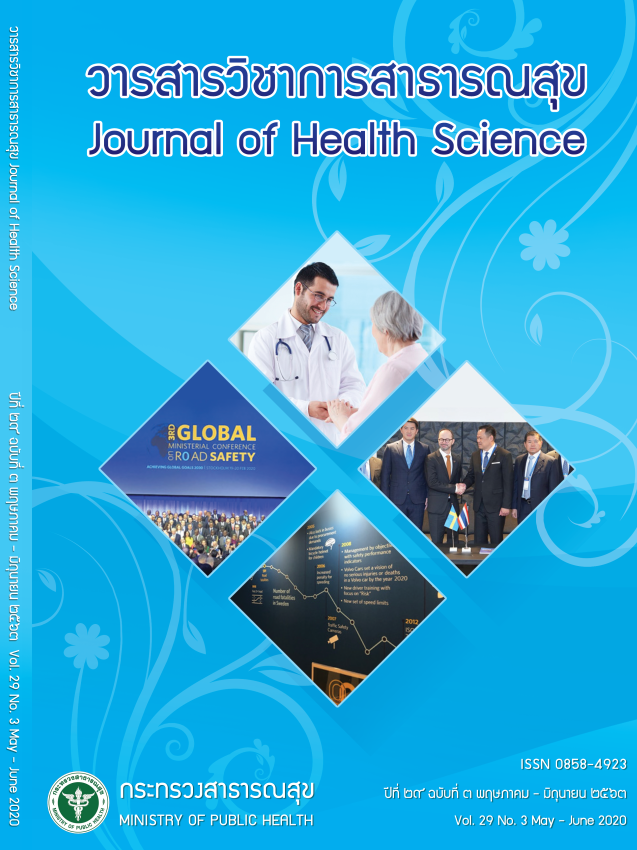Effectiveness of Health Literacy and Health Behavior Development Program for Working People
Keywords:
health literacy, health behavior, working peopleAbstract
Enhancing effects healthy literacy and health behaviors is important for leading to good health for the people. The objective of this study was to investigate the effects of healthy literacy and health behavior development program of working people. The study design was a quasi-experimental study. Working people who live in rural area, northeast, Thailand were randomly assigned to classes in this study. They were 30 and 30 peoples in the experimental group and control group respectively. The research instruments were (1) the health literacy development program that was developed based on Health Education Division’s health literacy development concept. Activities included practice assessing and analyzing the causes of their own risk behaviors, educating group discussion, demonstration and return demonstration, practice of recording behavior, using role model of health care, mind contract and home visit, (2) a questionnaires of health literacy and health behavior. Data were analyzed by descriptive statistics and t-test. The results reveled that after enrolling the program, mean of health literacy and health behavior in the experimental group were significant higher than before enrolling the program and higher than comparison group (p-value .05). The results of the research suggest that the health literacy development program improves healthy literacy and health behavior in working people and should conduct activities and evaluate continuously in order to be consistent with the changing context and encourage the persistence of health literacy and health behavior.
Downloads
References
Nutbeam D. The evolving concept of health literacy. Social Science & Medicine 2008;67(12):2072-78.
Quinlan P, Price KO, Magid SK, Lyman S, Mandl LA, Stone PW. The relationship among health literacy, health knowledge, and adherence to treatment in patients with rheumatoid arthritis. HSS J 2013;9(1):42-9.
กองสุขศึกษา กรมสนับสนุนบริการสุขภาพ กระทรวงสาธารณสุข. การเสริมสร้างและประเมินความรอบรู้ด้านสุขภาพและพฤติกรรมสุขภาพ กลุ่มเด็กวัยเรียน กลุ่มวัยทำงาน. พิมพ์ครั้งที่ 1. กรุงเทพมหานคร: นิวธรรมดาการ-พิมพ์; 2559.
McCarthy D, Waite K, Curtis L, Engel K, Baker D, Wolf D. What did the doctor say? Health literacy and recall of medical instructions. Medicare 2012;50(4):277-82.
Jordan J, Burchbinder R, Osborne R. Conceptualising health literacy from the patient perspective. Patient and Education Counseling 2010;79(1):36-42.
Cho YI, Lee SY, Arozullah AM, Crittenden KS. Effects of health literacy on health status and health service uti-lization among the eldery. Soc Sci Med 2008;66(8):1809-16.
Von Wagner C, Knight k, Steptoe A, Wardle J. Func-tional health literacy and health promoting behavior in a national sample of British adults. J Epidemiol Commu-nity Health 2007;61(12):1086-90.
Nutbeam D, McGill B, Premkumar P. Improving health literacy in community population: a review of progress. Health Promot Int 2018;33(5):901-11.
อังศินันท์ อินทรกำแหง. ความรอบรู้ด้านสุขภาพ:การวัดและการพัฒนา. กรุงเทพมหานคร: สุขุมวิทการพิมพ์; 2560.
อรรถพล แก้วสัมฤทธิ์. การขับเคลื่อนความรอบรู้ด้านสุขภาพ และการสื่อสารสุขภาพ [อินเทอร์เน็ต]. 2560 [สืบค้นเมื่อ 23 ต.ค. 2560]. แหล่งข้อมูล: http://www.anamai.moph.go.th/ppf2017/
สำนักโรคไม่ติดต่อ กรมควบคุมโรค กระทรวงสาธารณสุข. รายงานประจำปี 2559. พิมพ์ครั้งที่ 1. กรุงเทพมหานคร: สำนักงานกิจการโรงพิมพ์องค์การสงเคราะห์ทหารผ่านศึก ในพระบรมราชูปถัมภ์; 2559.
สุพัตรา ศรีวณิชชากร. สถานการณ์การป่ วยและการตายด้วยโรคไม่ติดต่อเรื้อรัง (โรคเบาหวานชนิดที่ 2 และโรคหัวใจและหลอดเลือด) ในประเทศไทย ในระยะ 5 ปี (2553-2557). วารสารควบคุมโรค 2560;43(4):379-90.
จุรีพร คงประเสริฐ, ธิดารัตน์ อภิญญา, บรรณาธิการ. คู่มือปรับเปลี่ยนพฤติกรรมในคลินิก NCD คุณภาพ. กรุงเทพ-มหานคร: ชุมนุมสหกรณ์การเกษตรแห่งประเทศไทย; 2558.
คณะกรรมการอำนวยการการจัดทำแผนพัฒนาสุขภาพแห่ง-ชาติ ฉบับที่ 12. แผนพัฒนาสุขภาพแห่งชาติ ฉบับที่ 12 (พ.ศ. 2560-2564) [อินเทอร์เน็ต]. 2560 [สืบค้นเมื่อ 23 ต.ค. 2560]. แหล่งข้อมูล: http://wops.moph.go.th/ops/oic/data/20161115144754 _1_.pdf
ภานุวัฒน์ ปานเกตุ. 3 อ. 2 ส. ลดการเกิดโรคเรื้อรัง. นนทบุรี: สำนักสารนิเทศ สำนักงานปลัดกระทรวงสาธารณสุข; 2560.
กองสุขศึกษา กรมสนับสนุนบริการสุขภาพ กระทรวง-สาธารณสุข. รายงานผลการประเมินความรอบรู้ด้านสุขภาพและพฤติกรรมสุขภาพของประชาชนกลุ่มเป้ าหมายการดำเนินงาน ปีงบประมาณ พ.ศ. 2560. กรุงเทพมหานคร นิวธรรมดาการพิมพ์; 2560.
กระทรวงสาธารณสุข. รายงานการป่วยด้วยโรคไม่ติดต่อสำคัญ [อินเทอร์เน็ต].2561 [สืบค้นเมื่อ 15 กุมภาพันธ์ 2561]. แหล่งข้อมูล: https://hdcservice.moph.go.th/hdc/main/index_pk.php
Baker DW, Wolf M, Feinglass JM, Thompson JA, Gazmararian JA, Huang J. Health literacy and mortality among elderly persons. Arch Intern Med 2007;167(14): 1503-9.
อติญาณ์ ศรเกษตริน, รุ่งนภา จันทรา, รสติกร ขวัญชุม, ลัดดา เรืองด้วง. ผลของโปรแกรมปรับเปลี่ยนพฤติกรรมสุขภาพตามแนวทาง 3อ.2ส. ของอาสาสมัครสาธารณสุข ประจำหมู่บ้าน (อสม.) ต. คลองฉนาก อ.เมือง จ. สุราษฎร์-ธานี. วารสารเครือข่ายวิทยาลัยพยาบาลและการสาธารณสุข-ภาคใต้ 2560;4(1):253-64.
สุภาพ พุทธปัญโญ, นิจฉรา ทูลธรรม, นันทิพัฒน์ พัฒนโชติ. ประสิทธิผลของโปรแกรมพัฒนา พฤติกรรมสุขภาพต่อความฉลาดทางสุขภาพ พฤติกรรมการลดน้ำหนัก และน้ำหนักของบุคลากรที่มีภาวะโภชนาการเกินในโรงพยาบาลร้อยเอ็ด อำเภอเมือง จังหวัดร้อยเอ็ด. วารสารการพยาบาลและการ-ศึกษา 2559;9(4):42-59.
อารยา เชียงของ. ผลการพัฒนาความรอบรู้ด้านสุขภาพด้วยการจัดการเรียนรู้เพื่อการเปลี่ยนแปลงที่มีต่อพฤติกรรมการควบคุมระดับน้ำตาลในเลือดของผู้ป่ วยโรคเบาหวาน [วิทยา-นิพนธ์ปริญญาปริญญาปรัชญาดุษฎีบัณฑิต]. กรุงเทพมหานคร: มหาวิทยาลัยศรีนครินทรวิโรฒ; 2561. 271 หน้า.
รุ่งนภา อาระหัง, สุธีรา ฮุ่นตระกูล, ศศิธร รุจนเวช. ผลของโปรแกรมการส่งเสริมความรอบรู้ด้านสุขภาพในการป้องกันโรคความดันโลหิตสูงสำหรับกลุ่มเสี่ยงโรคความดันโลหิตสูงที่ชุมชนแห่งหนึ่งในจังหวัดนครปฐม. วารสารแพทย์นาวี 2561;45(3):253-64.
Cohen J. Statistical power analysis for the behavioral sciences. 2nd ed. Hillsdale, NJ: Lawrence Earlbaum Associates; 1988.
กองสุขศึกษา กระทรวงสาธารณสุข. แบบประเมินความรอบรู้ด้านสุขภาพและพฤติกรรมสุขภาพตาม 3อ.2ส. ของกลุ่มวัยทำงาน [อินเทอร์เน็ต]. 2561 [สืบค้นเมื่อ 18 มี.ค. 2561]. แหล่งข้อมูล: http://www.hed.go.th/linkHed/333
ทิศนา แขมณี. ศาสตร์การสอน: องค์ความรู้เพื่อการจัดกระบวนการเรียนรู้ที่มีประสิทธิภาพ. กรุงเทพมหานคร: ด่านสุทธาการพิมพ์; 2553.
Becker MH. The health belief model and prediction of dietary compliance: a field experiment. J Health Soc Behav 1977;18(4):348-66.
Taggart J, Williams A, Dennis S, Newall A, Shortus T, Zwar N, et al. A systematic review of interventions in primary care to improve health literacy for chronic disease behavioral risk factors. BMC Fam Pract 2012;13(1):49.
พรวิจิตร ปานนาค, สุทธีพร มูลศาสตร์, เชษฐา แก้วพรม. ประสิทธิผลของโปรแกรมการพัฒนาความฉลาดทางสุขภาพของผู้ป่ วยเบาหวานชนิดที่ 2 ที่ควบคุมระดับน้ำตาลไม่ได้ ตำบลบางวัว อำเภอบางปะกง จังหวัดฉะเชิงเทรา. วารสารพยาบาลกระทรวงสาธารณสุข 2560;27(3):91-106.
บุญใจ ศรีสถิตนรากูร. ระบบวิธีการวิจัยทางพยาบาลศาสตร์. พิมพ์ครั้งที่ 5. กรุงเทพมหานคร: ยูแอนด์ไออินเตอร์มีเดีย; 2553.
Downloads
Published
How to Cite
Issue
Section
License

This work is licensed under a Creative Commons Attribution-NonCommercial-NoDerivatives 4.0 International License.







